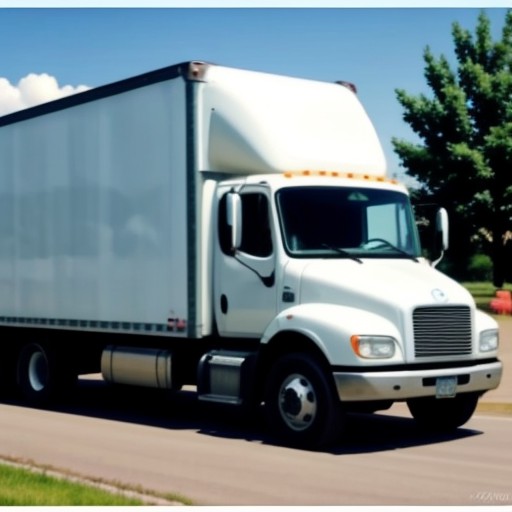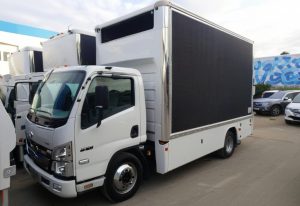
Introduction to Refrigerated Trucks
Ever wondered how that fresh salmon you had for dinner made its way from the icy waters of Alaska to your local grocery store? Or how life-saving vaccines are transported safely across countries? The unsung hero in these scenarios is the refrigerated truck, a marvel of modern logistics that ensures temperature-sensitive goods reach their destination in perfect condition. These trucks are more than just vehicles; they are critical components in the cold chain logistics that underpin various industries.
Refrigerated trucks, also known as reefers, are specialized vehicles designed to transport perishable goods at specific temperatures. They are equipped with refrigeration units that maintain a consistent temperature throughout the journey, ensuring that the cargo remains fresh and safe. The importance of refrigerated trucks cannot be overstated, as they play a crucial role in industries such as food, pharmaceuticals, and biotechnology.
The History of Refrigerated Trucks
Early Innovations
The concept of refrigerated transport isn’t exactly new. In fact, it dates back to the 19th century when ice was the primary cooling agent. Imagine early pioneers placing blocks of ice around perishables in horse-drawn carriages. Primitive, right? Yet, it worked well enough to keep basic goods from spoiling over short distances.
In the early days, ice was harvested from frozen lakes and rivers during winter and stored in insulated ice houses for use throughout the year. This method was labor-intensive and not very efficient, but it was the best available option at the time. The first recorded use of ice for transporting perishable goods was in 1842 when ice was used to ship fresh meat from New York to Texas.
The real breakthrough came in the mid-19th century with the invention of mechanical refrigeration. In 1867, the first patent for a refrigerated railway car was issued to J.B. Sutherland of Detroit. This car used ice and salt to create a cooling effect, allowing perishable goods to be transported over longer distances without spoiling.
Modern Advancements
Fast forward to today, and we have state-of-the-art refrigerated trucks equipped with sophisticated cooling systems. Modern refrigerated trucks use advanced refrigeration units powered by diesel engines or even electric power sources. The evolution has been nothing short of remarkable, turning what was once a luxury into an indispensable part of our supply chain.
Today’s refrigerated trucks are marvels of engineering, featuring highly efficient refrigeration units that can maintain precise temperatures ranging from -30°C to +30°C. These units use a variety of cooling methods, including mechanical refrigeration, cryogenic cooling, and eutectic plates. Additionally, modern refrigerated trucks are equipped with advanced insulation materials that minimize heat transfer and ensure temperature stability.
Technological advancements have also led to the development of multi-temperature refrigerated trucks, which can transport different types of goods at varying temperatures within the same vehicle. This innovation has significantly improved the efficiency and flexibility of cold chain logistics.
How Refrigerated Trucks Work
Cooling Mechanisms
So, how do these trucks keep things cool? At the heart of a refrigerated truck is its cooling mechanism, typically a vapor compression system. This system includes a compressor, condenser, expansion valve, and evaporator, working in harmony to remove heat from the truck’s interior and maintain a specified temperature.
The vapor compression system operates on the principle of thermodynamics. Here’s a simplified breakdown of how it works:
- Compression: The refrigerant gas is compressed by the compressor, raising its pressure and temperature.
- Condensation: The high-pressure, high-temperature gas flows through the condenser coils, where it releases heat to the surroundings and condenses into a high-pressure liquid.
- Expansion: The high-pressure liquid passes through an expansion valve, where its pressure drops suddenly, causing it to evaporate into a low-pressure gas.
- Evaporation: The low-pressure gas absorbs heat from the truck’s interior as it flows through the evaporator coils, cooling the cargo area. The cycle then repeats.
Temperature Control
But it’s not just about cooling; it’s about precise temperature control. Sensors and thermostats play a vital role here, ensuring that the cargo stays within the desired temperature range. Whether it’s frozen foods needing sub-zero conditions or fresh produce requiring just a slight chill, these trucks can handle it all.
Modern refrigerated trucks are equipped with advanced temperature monitoring and control systems that provide real-time data on the cargo’s temperature. These systems use sensors placed throughout the cargo area to continuously measure temperature and humidity levels. If any deviations from the set parameters are detected, corrective actions are taken automatically to maintain the desired conditions.
Additionally, many refrigerated trucks are now equipped with telematics systems that allow remote monitoring and control of temperature settings. This technology enables logistics managers to track their fleets in real-time and make adjustments as needed to ensure optimal conditions for perishable goods.
Importance in the Food Industry
Transporting Perishables
When it comes to the food industry, refrigerated trucks are nothing short of essential. They transport everything from dairy products and meats to fruits and vegetables. Without these trucks, your favorite grocery stores would struggle to stock fresh items, leading to food shortages and higher prices.
The global food supply chain relies heavily on refrigerated trucks to transport perishable goods from farms and processing plants to distribution centers and retail stores. These trucks ensure that fresh produce reaches consumers in peak condition, maintaining its nutritional value and taste.
One of the key benefits of refrigerated trucks is their ability to extend the shelf life of perishable goods. By maintaining consistent temperatures during transport, these trucks slow down the natural decay processes that cause spoilage. This means that fruits and vegetables can stay fresh for longer periods, reducing food waste and ensuring a steady supply of fresh produce.
Ensuring Food Safety
Food safety is another critical aspect. By maintaining consistent temperatures, refrigerated trucks help prevent bacterial growth and spoilage. This means that when you buy food products, you can trust that they are safe to consume, thanks to these mobile cooling units.
Temperature control is crucial for preventing foodborne illnesses caused by bacteria such as Salmonella, E.coli, and Listeria. These pathogens thrive at temperatures between 5°C and 60°C (41°F and 140°F), known as the “danger zone.” Refrigerated trucks keep perishable goods out of this danger zone by maintaining temperatures below 5°C (41°F), effectively inhibiting bacterial growth.
In addition to temperature control, refrigerated trucks often feature advanced sanitation systems that help maintain a clean environment for transporting food products. These systems include antimicrobial coatings, UV-C light disinfection, and air filtration systems that reduce the risk of contamination.

Impact on the Pharmaceutical Industry
Vaccine Distribution
In the pharmaceutical world, the importance of refrigerated trucks cannot be overstated. Take vaccine distribution, for instance. Vaccines often require storage at specific temperatures to remain effective. During the COVID-19 pandemic, refrigerated trucks played a crucial role in distributing vaccines worldwide, ensuring they reached clinics and hospitals without losing potency.
Vaccines are highly sensitive to temperature fluctuations. For instance, some COVID-19 vaccines needed to be stored at ultra-low temperatures of -70°C (-94°F). Refrigerated trucks equipped with specialized refrigeration units were essential for transporting these vaccines from manufacturing facilities to distribution centers and healthcare providers.
The success of global vaccination campaigns hinges on the reliability of refrigerated transport. Without these trucks, it would be impossible to maintain the cold chain required for vaccine efficacy. They ensure that vaccines reach even the most remote locations, contributing to public health efforts and saving lives.
Transporting Temperature-Sensitive Medications
Beyond vaccines, many other medications are temperature-sensitive. Insulin for diabetes patients and certain cancer treatments need to be kept cool. Refrigerated trucks ensure these vital medications are transported safely, making them accessible to those who need them most.
Insulin, for example, must be stored at temperatures between 2°C and 8°C (36°F and 46°F) to remain effective. If exposed to higher temperatures, insulin can degrade, rendering it ineffective. Refrigerated trucks provide a controlled environment for transporting insulin from manufacturers to pharmacies and healthcare facilities.
Similarly, biologics and biosimilars—advanced therapies derived from living organisms—require precise temperature control during transport. These medications are used to treat various conditions, including autoimmune diseases and cancers. The integrity of these therapies depends on maintaining a consistent cold chain, which is where refrigerated trucks come into play.
Environmental Impact
Fuel Consumption
While refrigerated trucks are indispensable, they do come with an environmental cost. These trucks often run on diesel, which contributes to greenhouse gas emissions. However, strides are being made to improve fuel efficiency and reduce the carbon footprint of these vehicles.
The refrigeration units on these trucks consume additional fuel, leading to higher overall fuel consumption compared to non-refrigerated vehicles. This increased fuel usage results in higher emissions of carbon dioxide (CO2), nitrogen oxides (NOx), and particulate matter (PM), contributing to air pollution and climate change.
To address these environmental concerns, manufacturers are developing more fuel-efficient refrigeration units and exploring alternative power sources. For example, some modern refrigerated trucks use hybrid systems that combine diesel engines with electric motors, reducing fuel consumption and emissions.
Eco-Friendly Alternatives
There’s also a push towards eco-friendly alternatives. Electric refrigerated trucks are becoming more common, offering a greener option for cold chain logistics. These innovations promise to make refrigerated transport more sustainable without sacrificing performance.
Electric refrigerated trucks use battery-powered refrigeration units that produce zero emissions during operation. These vehicles are ideal for urban deliveries where air quality regulations are stricter and noise pollution is a concern. By reducing reliance on diesel fuel, electric refrigerated trucks help mitigate the environmental impact of cold chain logistics.
Additionally, advancements in solar power technology are being integrated into refrigerated transport. Solar panels installed on the roofs of refrigerated trucks can generate electricity to power the refrigeration units, further reducing the need for fossil fuels.
Technological Innovations
GPS Tracking
Technology has transformed refrigerated trucking in recent years. One notable advancement is GPS tracking. This allows companies to monitor their fleets in real-time, ensuring timely deliveries and optimal routes. It also adds an extra layer of security for valuable cargo.
GPS tracking systems provide real-time data on the location and status of refrigerated trucks. Logistics managers can use this information to optimize delivery routes, reduce fuel consumption, and improve overall efficiency. Additionally, GPS tracking enhances security by allowing companies to monitor their fleets and respond quickly to any unauthorized activities or delays.
Advanced telematics systems integrate GPS tracking with temperature monitoring, providing comprehensive data on both the truck’s location and the cargo’s condition. This integration allows for proactive management of temperature-sensitive shipments, ensuring that any deviations from the desired conditions are addressed promptly.
Advanced Insulation Materials
Insulation technology has also seen significant improvements. Modern refrigerated trucks use advanced insulation materials that provide better thermal efficiency. This means less energy is required to maintain temperatures, making the trucks more efficient and cost-effective.
Traditional insulation materials like polyurethane foam have been widely used in refrigerated trucks due to their excellent thermal properties. However, new materials such as vacuum-insulated panels (VIPs) and aerogels offer even greater insulation performance with thinner profiles. These advanced materials reduce heat transfer and improve energy efficiency.
Vacuum-insulated panels consist of a core material encased in a vacuum-sealed envelope, providing exceptional thermal resistance. Aerogels, on the other hand, are lightweight materials with low thermal conductivity, making them ideal for insulation applications in refrigerated transport.
By incorporating these advanced insulation materials, modern refrigerated trucks can maintain stable temperatures with less energy consumption, reducing operational costs and environmental impact.
Challenges Faced by Refrigerated Trucks
Maintenance Costs
Owning and operating a refrigerated truck isn’t cheap. Maintenance costs can be high due to the complex refrigeration systems that need regular servicing. Companies must balance these costs with the benefits of having a reliable cold chain logistics system.
Refrigeration units require routine maintenance to ensure optimal performance and prevent breakdowns. This maintenance includes checking refrigerant levels, inspecting compressor components, cleaning condenser coils, and calibrating temperature sensors. Neglecting maintenance can lead to system failures and costly repairs.
In addition to refrigeration unit maintenance, the insulation materials and structural integrity of the truck must be regularly inspected. Any damage to the insulation can compromise temperature control and increase energy consumption. Companies must invest in skilled technicians and high-quality maintenance practices to keep their refrigerated fleets in top condition.
Regulatory Compliance
Then there’s regulatory compliance. Different countries have various regulations concerning the transportation of temperature-sensitive goods. Companies must navigate these regulations carefully to avoid penalties and ensure smooth operations.
Regulations governing refrigerated transport cover a wide range of aspects, including temperature monitoring, hygiene standards, vehicle design, and driver training. Compliance with these regulations is essential for ensuring food safety and maintaining product integrity.
For example, in the European Union, the ATP (Agreement on the International Carriage of Perishable Foodstuffs) sets out standards for the construction and equipment of refrigerated vehicles used for cross-border transport of perishable goods. In the United States, the Food Safety Modernization Act (FSMA) includes provisions related to the sanitary transportation of human and animal food.
Navigating these regulatory requirements can be complex, especially for companies operating in multiple regions with different standards. Staying up-to-date with regulatory changes and implementing robust compliance programs is crucial for maintaining a reliable cold chain logistics system.
Future Trends in Refrigerated Trucking
Automation and AI
The future looks promising with advancements in automation and artificial intelligence (AI). Imagine self-driving refrigerated trucks that can optimize routes on-the-fly or AI systems that can predict maintenance needs before a breakdown occurs. These technologies are set to revolutionize the industry.
Self-driving technology is making significant strides, and its application in refrigerated trucking holds great potential. Autonomous refrigerated trucks can operate around the clock without the need for rest breaks, significantly increasing efficiency and reducing delivery times. Additionally, AI-powered systems can analyze vast amounts of data to optimize routes, reducing fuel consumption and emissions.
Predictive maintenance is another area where AI is making an impact. By analyzing data from sensors and historical maintenance records, AI algorithms can predict when a refrigeration unit is likely to fail and schedule preventive maintenance accordingly. This proactive approach minimizes downtime and ensures that refrigerated trucks remain operational, reducing the risk of cargo spoilage.
Sustainable Practices
Sustainability will also be a key focus. From using renewable energy sources to adopting biodegradable insulation materials, the industry is moving towards more sustainable practices. These efforts will help mitigate environmental impact while maintaining efficiency.
One of the most promising sustainable practices is the adoption of electric refrigerated trucks. As battery technology continues to improve, electric trucks are becoming more viable for long-haul transportation. These vehicles produce zero tailpipe emissions, reducing their environmental impact and contributing to cleaner air quality.
Renewable energy sources, such as solar power, are also being integrated into refrigerated trucking. Solar panels installed on the roofs of refrigerated trailers can generate electricity to power the refrigeration units, reducing reliance on fossil fuels and lowering operating costs.
Biodegradable insulation materials are another innovation that holds promise for sustainability. Traditional insulation materials, such as polyurethane foam, are not biodegradable and contribute to landfill waste at the end of their lifecycle. Researchers are developing new insulation materials made from natural fibers and biodegradable polymers that provide excellent thermal performance while being environmentally friendly.
Conclusion
Refrigerated trucks may not always be in the spotlight, but their role in our daily lives is undeniable. They ensure that our food is fresh, our medications are effective, and our vaccines are potent. As technology continues to evolve, these trucks will only become more efficient and environmentally friendly. So, the next time you enjoy a fresh meal or receive vital medication, take a moment to appreciate the incredible journey it took in a refrigerated truck.
The future of refrigerated trucking is bright, with innovations in automation, AI, and sustainability driving the industry forward. As these technologies become more widespread, refrigerated trucks will continue to play a critical role in maintaining the integrity of temperature-sensitive goods and supporting global supply chains.
In conclusion, refrigerated trucks are an indispensable part of modern logistics. Their ability to transport perishable goods safely and efficiently has transformed industries such as food and pharmaceuticals. With ongoing advancements in technology and a growing focus on sustainability, the refrigerated trucking industry is poised for continued growth and innovation. So, whether it’s delivering fresh produce to your local grocery store or ensuring life-saving medications reach patients in need, refrigerated trucks are truly the backbone of cold chain logistics.







